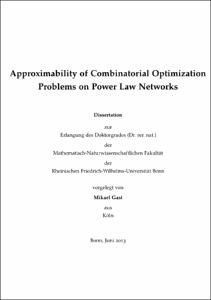Approximability of Combinatorial Optimization Problems on Power Law Networks

Approximability of Combinatorial Optimization Problems on Power Law Networks

| dc.contributor.advisor | Karpinski, Marek | |
| dc.contributor.author | Gast, Mikael | |
| dc.date.accessioned | 2020-04-19T00:22:39Z | |
| dc.date.available | 2020-04-19T00:22:39Z | |
| dc.date.issued | 30.10.2013 | |
| dc.identifier.uri | https://hdl.handle.net/20.500.11811/5765 | |
| dc.description.abstract | One of the central parts in the study of combinatorial optimization is to classify the NP-hard optimization problems in terms of their approximability. In this thesis we study the Minimum Vertex Cover (Min-VC) problem and the Minimum Dominating Set (Min-DS) problem in the context of so called power law graphs. This family of graphs is motivated by recent findings on the degree distribution of existing real-world networks such as the Internet, the World-Wide Web, biological networks and social networks. In a power law graph the number of nodes yi of a given degree i is proportional to i-ß, that is, the distribution of node degrees follows a power law. The parameter ß > 0 is the so called power law exponent. With the aim of classifying the above combinatorial optimization problems, we are pursuing two basic approaches in this thesis. One is concerned with complexity theory and the other with the theory of algorithms. As a result, our main contributions to the classification of the problems Min-VC and Min-DS in the context of power law graphs are twofold: - Firstly, we give substantial improvements on the previously known approximation lower bounds for Min-VC and Min-DS in combinatorial power law graphs. More precisely, we are going to show the APX-hardness of Min-VC and Min-DS in connected power law graphs and give constant factor lower bounds for Min-VC and the first logarithmic lower bounds for Min-DS in this setting. The results are based on new approximation-preserving embedding reductions that embed certain instances of Min-VC and Min-DS into connected power law graphs. - Secondly, we design a new approximation algorithm for the Min-VC problem in random power law graphs with an expected approximation ratio strictly less than 2. The main tool is a deterministic rounding procedure that acts on a half-integral solution for Min-VC and produces a good approximation on the subset of low degree vertices. Moreover, for the case of Min-DS, we improve on the previously best upper bounds that rely on a greedy algorithm. The improvements are based on our new techniques for determining upper and lower bounds on the size and the volume of node intervals in power law graphs. | |
| dc.language.iso | eng | |
| dc.rights | In Copyright | |
| dc.rights.uri | http://rightsstatements.org/vocab/InC/1.0/ | |
| dc.subject | Approximationsalgorithmen | |
| dc.subject | Approximierbarkeit | |
| dc.subject | Kombinatorische Optimierung | |
| dc.subject | Power-Law-Graphen | |
| dc.subject | Netzwerk-Probleme | |
| dc.subject | Approximation Algorithms | |
| dc.subject | Approximability | |
| dc.subject | Combinatorial Optimization | |
| dc.subject | Power Law Graphs | |
| dc.subject | Network Problems | |
| dc.subject.ddc | 004 Informatik | |
| dc.title | Approximability of Combinatorial Optimization Problems on Power Law Networks | |
| dc.type | Dissertation oder Habilitation | |
| dc.publisher.name | Universitäts- und Landesbibliothek Bonn | |
| dc.publisher.location | Bonn | |
| dc.rights.accessRights | openAccess | |
| dc.identifier.urn | https://nbn-resolving.org/urn:nbn:de:hbz:5n-33565 | |
| ulbbn.pubtype | Erstveröffentlichung | |
| ulbbnediss.affiliation.name | Rheinische Friedrich-Wilhelms-Universität Bonn | |
| ulbbnediss.affiliation.location | Bonn | |
| ulbbnediss.thesis.level | Dissertation | |
| ulbbnediss.dissID | 3356 | |
| ulbbnediss.date.accepted | 04.09.2013 | |
| ulbbnediss.fakultaet | Mathematisch-Naturwissenschaftliche Fakultät | |
| dc.contributor.coReferee | Röglin, Heiko |
Files in this item
This item appears in the following Collection(s)
-
E-Dissertationen (4077)




